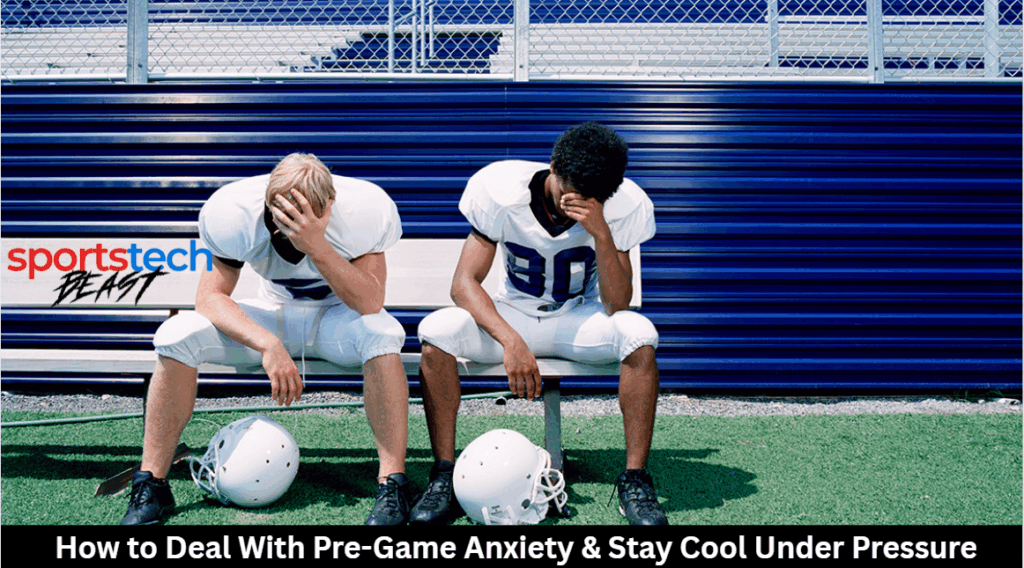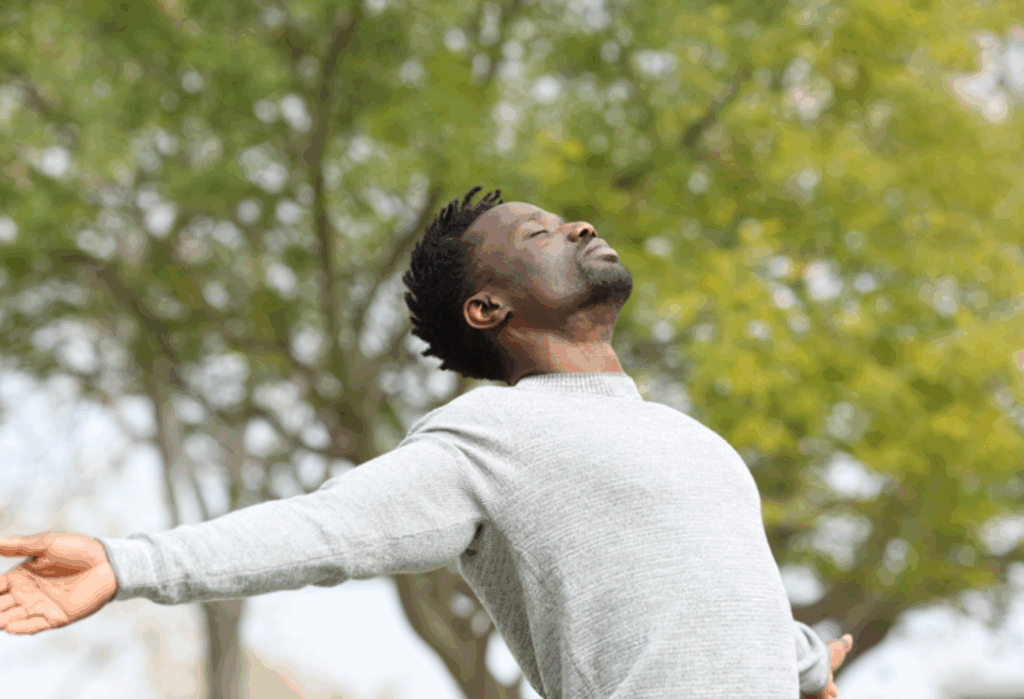Pre-game anxiety is normal and manageable with the right techniques. Establish a consistent routine that includes both physical and mental preparation. Practice deep breathing (like the 4-7-8 method) to calm your nervous system, and use visualization to rehearse success mentally.
Transform negative thoughts into positive self-talk, and reframe pressure as an opportunity rather than a threat. Champions don’t eliminate anxiety. They channel it into focused performance. The following strategies will transform your pre-game jitters into competitive advantages.

Understanding Pre-Game Anxiety
You may be experiencing what athletes at all levels deal with when your heart races and your thoughts scatter before a big game: pre-game anxiety. Professionals and amateurs also experience that natural response, such as butterflies in your stomach, sweating, racing thoughts, or trouble concentrating.
Pre-game anxiety is caused by your body going into fight or flight mode under performance pressure. You think competition is a threat, and release adrenaline and cortisol. Some nervous energy is actually not harmful. Mild anxiety sharpens focus and speeds up reaction time.
How to recognize when these feelings turn helpful excitement into harmful stress? Identifying your anxiety signals allows you to choose the right techniques to use that energy to boost your performance instead of having it wreck your performance.

Building a Solid Game-Day Routine
Although talent and training are crucial, champions separate themselves through consistent pre-game routines that transform anxiety into focused energy. Your game day routine provides a mental anchor when competition pressure mounts.
First, list down your ideal timeline, from wake-up call to game time. Include nutrition, warming-up exercises, and mental quiet moments. Best stress management strategies involve both physical and psychological components. You may have a light meal, do dynamic stretching, visualization, and perhaps some music.
Experiment during practice sessions to discover what works best for you, then commit to it. When you follow the same sequence before every competition, your body and mind recognize these cues as preparation for peak performance, reducing uncertainty and calming pre-game jitters.
Mental Strategies for Staying Calm
While physical preparation builds your competitive foundation, mastering your mental game often determines success under pressure. Visualization exercises allow you to practice your performance physically before it occurs mentally. Spend 5-10 minutes daily imagining yourself executing perfectly in game conditions.
Positive self-talk can counteract doubt that causes anxiety. Replace “I hope I don’t screw up” thoughts with “I’m prepared and capable.” When pressure builds, frame it as an opportunity to show off your skills, not a threat.
Remember that champions are not people who never get nervous. It’s athletes who know how to direct that energy productively. These mental techniques turn anxiety into a performance-enhancing ally.

Breathing and Relaxation Techniques
As your heart races before competition, your breath becomes your most accessible tool for regaining control. Practice the 4-7-8 breathing technique. Breathe in for a count of four, pause for seven, then release your breath over eight counts. This pattern activates your parasympathetic nervous system, quickly calming your pre-game jitters.
Complement breathing techniques with progressive muscle relaxation. Start at your feet and work upward. Contract your muscles for a count of five before relaxing them. It releases physical tension that anxiety creates in your body.
During high-pressure moments in competition, return to your breath. A quick 3-second inhale followed by a controlled exhale can reset your focus between plays. These relaxation techniques don’t just manage anxiety. They improve your performance by keeping your mind clear and your body responsive.

Boosting Confidence Through Preparation
True confidence isn’t born in the moments before competition. It happens in the weeks and months of preparation leading up to game day. When you’ve repeatedly practiced under simulated pressure conditions, your body and mind know exactly what to do when it matters most.
Create high-stakes practice scenarios that mirror game situations. When faced with crowd noise, practice with recordings. For cold-weather training, train in similar conditions. Having this environmental preparation removes unknowns that cause anxiety.
Mental rehearsal is equally important for building confidence. Regularly picture yourself overcoming difficulties. Review and learn from past performances, both successes and failures, to identify patterns and improvements.
Develop a pre-game checklist covering equipment, nutrition, and mental preparation so nothing is left to chance when competition arrives.
In-the-Moment Pressure Management
Even with thorough preparation, intense moments during competition can trigger anxiety spikes that threaten your performance. When this happens, quick mental resets become essential for effective in-the-moment pressure management.
Focus on your breathing. A few deep inhales can clear your mind when tension builds. Direct your attention to specific actions rather than potential outcomes. Instead of worrying about missing a shot, concentrate on your form and technique.
Your body language matters too. Keep a confident posture when you feel anxious. It shows opponents that you are strong and tricks your brain into feeling more confident. Stay present, control what you can, and trust your training.
Frequently Asked Questions
Should I Take Supplements to Reduce Game-Day Anxiety?
Focus on mental techniques and breathing instead. Supplements aren’t necessary for most athletes. If you’re considering them, consult a doctor first. Natural methods like visualization and proper warm-ups work better long-term.
How Do Elite Athletes Handle Mistakes During High-Pressure Moments?
Elite athletes quickly acknowledge mistakes, then refocus on the present moment. You’ll perform better when you use quick mental resets, maintain positive body language, and concentrate on your next action rather than dwelling on errors.
Can Anxiety Affect Different Sports in Unique Ways?
Yes, anxiety manifests differently across sports. You’ll face more mental pressure in precision sports like golf, while team sports create social anxiety. Contact sports trigger physical fear, and individual sports intensify personal performance pressure.
When Should I Seek Professional Help for Performance Anxiety?
Seek professional help if your anxiety severely impacts performance, causes physical symptoms, persists despite self-help strategies, triggers panic attacks, or affects your daily life beyond sports. Don’t hesitate to talk with a sports psychologist.
How Does Sleep Quality Impact Pre-Game Nerves?
Poor sleep amplifies your anxiety and impairs focus. When you’re well-rested, you’ll manage nerves better, think clearer, and recover faster. Prioritize 7-9 hours of quality sleep before competition to strengthen your mental resilience.





